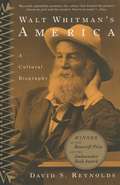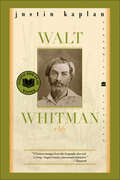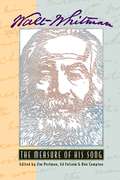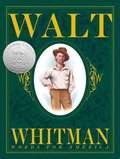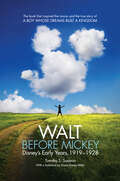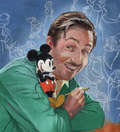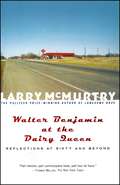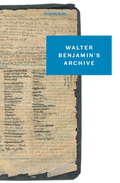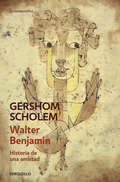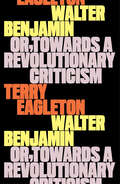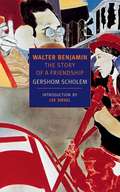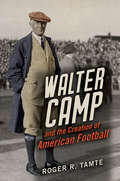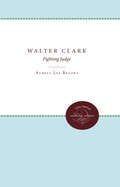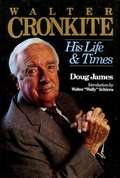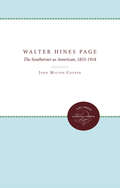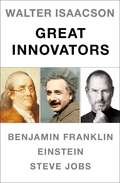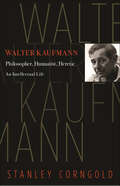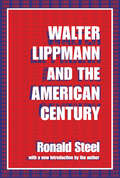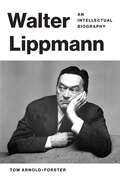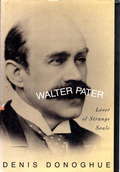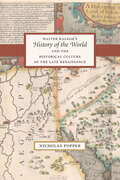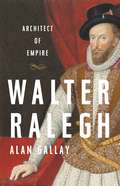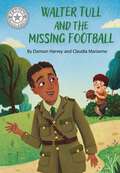- Table View
- List View
Walt Whitman's America: A Cultural Biography
by David S. ReynoldsIn his poetry Walt Whitman set out to encompass all of America and in so doing heal its deepening divisions. This magisterial biography demonstrates the epic scale of his achievement, as well as the dreams and anxieties that impelled it, for it places the poet securely within the political and cultural context of his age. Combing through the full range of Whitman's writing, David Reynolds shows how Whitman gathered inspiration from every stratum of nineteenth-century American life: the convulsions of slavery and depression; the raffish dandyism of the Bowery "b'hoys"; the exuberant rhetoric of actors, orators, and divines. We see how Whitman reconciled his own sexuality with contemporary social mores and how his energetic courtship of the public presaged the vogues of advertising and celebrity. Brilliantly researched, captivatingly told, Walt Whitman's America is a triumphant work of scholarship that breathes new life into the biographical genre.From the Trade Paperback edition.
Walt Whitman: A Life
by Justin KaplanThe Pulitzer Prize and National Book Award-winning author “gives us flesh and blood Whitman in this fine and sensitive biography” (The Boston Globe).A moving, penetrating, sharply focused portrait of America’s greatest poet—his genius, his passions, his androgynous sensibility—an exuberant life entwined with the turbulent history of mid-nineteenth century America. In vivid detail, Justin Kaplan, winner of the Pulitzer Prize and the National Book Award, examines the mysterious selves of this enigmatic man whose bold voice of joy and sexual liberation embraced a growing nation . . . and exposes the quintessential Whitman, that perfect poet whose astonishing verse made “words sing, dance, kiss, copulate” for an entire world to hear.“Whitman emerges from this biography alive and kicking—hugely human, enormously attractive.” —Newsweek“Not only readable, but dramatic.” —The New York Times Book Review“A buoyant, energizing book.” —The Nation“Brilliant.” —Publishers Weekly
Walt Whitman: The Measure of His Song
by Ed Folsom Dan Campion Jim PerlmanFirst published to wide critical acclaim in 1981, this revised and expanded monumental anthology charts the ongoing American and international response to the legacy of the seminal poet Walt Whitman (1819-1892). <P> Beginning with Ralph Waldo Emerson's famous 1855 letter ("I greet you at the beginning of a great career..."), this new edition contains responses from Thoreau, Pound, Lawrence, Neruda, Borges, Ginsberg, Jordan, Duncan, Le Sueur, Rich, Snyder and Alexie, among many others. "I know of no more convincing proof of Walt Whitman's impact upon the poetic mind (both at home and abroad) than this collection of tributes by poets -- in prose and verse" -- Gay Wilson Allen, The Solitary Singer.Includes 17 black & white photos.
Walt Whitman: Words for America
by Brian Selznick Barbara KerleyThe pioneering team that brought you the Caldecott Honor-winning THE DINOSAURS OF WATERHOUSE HAWKINS focuses their remarkable skills and vision on Walt Whitman--poet, American, Civil War hero. Did you know that poet Walt Whitman was also a Civil War nurse? Devastated by his country dividing and compelled to service by his brother's war injury, Walt nursed all soldiers-Union & Confederate, black & white. By getting to know them through many intense and affecting experiences, he began to see a greater life purpose: His writing could give these men a voice, & in turn, achieve his greatest aspiration--to capture the true spirit of America. Dramatic, powerful, & deeply moving, this consummate portrait of Whitman will inspire readers to pick up their pens & open their hearts to humanity.<P><P> Winner of the Sibert Honor
Walt before Mickey: Disney's Early Years, 1919-1928
by Timothy S. SusaninFor ten years before the creation of Mickey Mouse, Walt Disney struggled with, failed at, and eventually mastered the art and business of animation. Most biographies of his career begin in 1928, when Steamboat Willie was released. That first Disney Studio cartoon with synchronized sound made its main character—Mickey Mouse—an icon for generations. But Steamboat Willie was neither Disney's first cartoon nor Mickey Mouse's first appearance. Prior to this groundbreaking achievement, Walt Disney worked in a variety of venues and studios, refining what would become known as the Disney style. In Walt before Mickey: Disney's Early Years, 1919–1928, Timothy Susanin creates a portrait of the artist from age seventeen to the cusp of his international renown. After serving in the Red Cross in France after World War I, Walt Disney worked for advertising and commercial art in Kansas City. Walt used these experiences to create four studios—Kaycee Studios, Laugh-O-gram Films, Disney Brothers Studio, and Walt Disney Studio. Using company documents, private correspondence between Walt and his brother Roy, contemporary newspaper accounts, and new interviews with Disney's associates, Susanin traces Disney's path. The author shows Disney to be a complicated, resourceful man, especially during his early career. Walt before Mickey, a critical biography of a man at a crucial juncture, provides the “missing decade” that started Walt Disney's career and gave him the skills to become a name known worldwide.
Walt's Imagination: The Life of Walt Disney (Big Words #10)
by Doreen RappaportWalt Disney's name is synonymous with family entertainment. Mickey Mouse, Snow White and the Seven Dwarfs, Bambi, Disneyland, and numerous other creations have inspired generations of children the world over. From his childhood in rural Missouri to his legendary stature as a film and television icon, Walt governed his life with imagination, ingenuity, and scrupulous attention to detail. Faced with both public failures and massive success, he revolutionized the art form of animation, always seeking innovative solutions, cutting edge technology, and new ways of storytelling. Devoted to perfection, Walt was not always easy to work with, but no one can deny his profound talent and impact. Charting Walt's progression from farm boy to actor to artist, animator, director, and entertainment celebrity, Walt's own words are presented and contextualized within Doreen Rappaport's signature compelling prose. Illustrated with vivid authenticity by animator/painter John Pomeroy, this stunning entry in the award-winning Big Words series reveals a man of deep and varied passions with a constantly evolving vision, and a storyteller above all.
Walter Benjamin at the Dairy Queen: Reflections at Sixty and Beyond
by Larry McmurtryMcMurtry (Pulitzer prize-winning author) read Walter Benjamin's essay about the death of the oral tradition in a Texas Dairy Queen 20 years prior to writing this book. Benjamin's essay serves as a springboard for McMurtry's examination of the lost art of storytelling, the meaning of reading, the death of the cowboy, and the significance of Texas' vast frontier. These are recollections of a cowboy childhood and McMurtry's eventual escape from the life of men and horses and into the culture of books. Annotation c. Book News, Inc., Portland, OR (booknews.com)
Walter Benjamin's Archive
by Walter Benjamin Ursula Marx Gudrun Schwarz Erdmut Wizisla Michael SchwarzAn absorbing selection of Walter Benjamin's personal manuscripts, images, and documents The work of the great literary and cultural critic Walter Benjamin is an audacious plotting of history, art, and thought; a reservoir of texts, commentaries, scraps, and fragments of everyday life, art, and dreams. Throughout his life, Benjamin gathered together all kinds of artifacts, assortments of images, texts, and signs, themselves representing experiences, ideas, and hopes, each of which was enthusiastically logged, systematized, and analyzed by their author. In this way, Benjamin laid the groundwork for the salvaging of his own legacy. Intricate and intimate, Walter Benjamin's Archive leads readers to the heart of his intellectual world, yielding a rich and detailed portrait of its author.From the Trade Paperback edition.gmatic Sibyls. Everything here is subtly interlinked with everything else.Intricate and intimate, Walter Benjamin's Archive leads right into the core of his work, yielding a rich and detailed portrait of its author.From the Hardcover edition.
Walter Benjamin. Historia de una amistad
by Gershom ScholemLa historia de la amistad que unió al autor y a Walter Benjamin durante una época fundamental de la cultura europea. «Entre todos los modos posibles de conseguir libros, el más glorioso es el de escribirlos uno mismo.» Así ironizaba sobre su vocación literaria Walter Benjamin (1892-1940), contrapunto de Gershom Scholem (1897-1982) en el ejercicio brillante de autobiografía que constituye este libro. Los años de aprendizaje, las primeras decepciones y un enfrentamiento dispar con una tradición cultural idéntica el judaísmo asimilado, constituyen el tejido de recuerdos que configura la memoria de una época fundamental de la cultura europea. Judaísmo y civilización burguesa en la polémica creativa de dos excepcionales pensadores de nuestro tiempo. Reseña:«Gershom Scholem era un adolescente precoz cuando se convirtió en el mejor amigo de Walter Benjamin. El relato de esta relación, crucial para ambos hasta el suicidio de Benjamin en 1940, es a la vez un tributo al genio de su amigo y un lamento por su autodestrucción personal e intelectual.»The New York Times Review of Books
Walter Benjamin: Or, Towards a Revolutionary Criticism
by Terry EagletonFrom our finest radical literary analyst, a classic study of the great philosopher and cultural theorist.
Walter Benjamin: The Story of a Friendship
by Gershom Scholem Lee Sigel Harry ZohnGershom Scholem is celebrated as the twentieth century's most profound student of the Jewish mystical tradition; Walter Benjamin, as a master thinker whose extraordinary essays mix the revolutionary, the revelatory, and the esoteric. Scholem was a precocious teenager when he met Benjamin, who became his close friend and intellectual mentor. His account of that relationship--which was to remain crucial for both men--is both a celebration of his friend's spellbinding genius and a lament for the personal and intellectual self-destructiveness that culminated in Benjamin's suicide in 1940. At once prickly and heartbroken, argumentative and loving, Walter Benjamin: The Story of a Friendship is an absorbing memoir with the complication of character and motive of a novel. As Scholem revisits the passionate engagements over Marxism and Kabbala, Europe and Palestine that he shared with Benjamin, it is as if he sought to summon up his lost friend's spirit again, to have the last word in the argument that might have saved his life.
Walter Camp and the Creation of American Football
by Roger R TamteWalter Camp made the development of football--indeed, its very creation--his lifelong mission. From his days as a college athlete, Camp's love of the game and dedication to its future put it on the course that would allow it to seize the passions of the nation. Roger R. Tamte tells the engrossing but forgotten life story of Walter Camp, the man contemporaries called "the father of American football." He charts Camp's leadership as American players moved away from rugby and for the first time tells the story behind the remarkably inventive rule change that, in Camp's own words, was "more important than all the rest of the legislation combined." Trials also emerged, as when disputes over forward passing, the ten-yard first down, and other rules became so public that President Theodore Roosevelt took sides. The resulting political process produced losses for Camp as well as successes, but soon a consensus grew that football needed no new major changes. American football was on its way, but as time passed, Camp's name and defining influence became lost to history. Entertaining and exhaustively researched, Walter Camp and the Creation of American Football weaves the life story of an important sports pioneer with a long-overdue history of the dramatic events that produced the nation's most popular game.
Walter Clark: Fighting Judge
by Aubrey Lee BrooksIn this life of Walter Clark, the author tells of an antebellum boyhood on a Carolina plantation and a long career of involvement in the bitterest sociopolitical battles the state of North Carolina has known, which won Clark a national reputation as a liberal noted for his straight thinking and his clear speaking.Originally published in 1947.A UNC Press Enduring Edition -- UNC Press Enduring Editions use the latest in digital technology to make available again books from our distinguished backlist that were previously out of print. These editions are published unaltered from the original, and are presented in affordable paperback formats, bringing readers both historical and cultural value.
Walter Cronkite: His Life and Times
by Doug JamesWalter Cronkite: His Life and Times traces the Dean of Newscasters through his incredible 41-year career—political conventions, wars, the Watergate years, selection of his successor, as well as glimpses into his personal life. <p><p> Walter Cronkite grew up with radio and worked briefly in that medium before distinguishing himself as a United Press correspondent during World War II. <p> His television career predated the "Golden Age" of television by two years. From 1950, when he joined a CBS affiliate in Washington, D.C., until his retirement in 1981, Cronkite literally helped invent television newscasting. <p> Cronkite's ability to cover world news without himself becoming part of the news was unique. His reputation for near total objectivity was phenomenal. Hailed by his peers, viewers and world leaders, Cronkite steadfastly refused to allow his notoriety to interfere with his ability to deliver the news of the day. <p> Cronkite was known as a "news junkie" by his family and friends and a taskmaster by his subordinates. As he demanded the best from his news team, he expected even more from himself as managing editor of the CBS Evening News. <p> His devotion to his profession earned him 11 Emmys and the unprecedented honor of being named the "most trusted man in America."
Walter Dean Myers: Writer for Real Teens
by Denise M. JordanPresents the life and career of the African-American author who grew up listening to stories and who carries on the storytelling tradition in his numerous and award-winning books.
Walter Hines Page: The Southerner As American, 1855-1918
by John Milton CooperThe varied career of Walter Hines Page affected many facets of the American political and social milieu from the end of Reconstruction through World War I. A North Carolinian, Page was one of the first southerners after Reconstruction to argue that sectional hostility was needless, and he constantly worked to restore national union and frequently acted as an interpreter for the North and the South. As a journalist, publisher, reformer, president-maker, and ambassador, he strove to assure both North and South that the southerner was basically an American, that southern problems were national ones, and that education and hard work could recreate the Union.As a young man, Page found the South too stifling to give scope to his ambitions. He left it for good at the age of twenty-nine to make a brilliant career as editor and book publisher in the North. He served as editor of Forum, Atlantic Monthly, and World's Work. Later he founded the publishing firm Doubleday, Page & Company. As a magazine editor he wrote about the problems of the South; as a book publisher he introduced many southern writers to the nation; as a member of several of the most powerful philanthropic boards he sought funds to improve education and public health in the South. As a result of his early support of Woodrow Wilson for the presidency, Page was appointed ambassador to the Court of St. James's from which he fervently advocated the Allied cause.Throughly researching both American and British government documents and private papers, and using interviews with Page's contemporaries, Cooper reinterprets and establishes the significance of Page's career.Originally published in 1977. A UNC Press Enduring Edition -- UNC Press Enduring Editions use the latest in digital technology to make available again books from our distinguished backlist that were previously out of print. These editions are published unaltered from the original, and are presented in affordable paperback formats, bringing readers both historical and cultural value.
Walter Isaacson Great Innovators E-Book Boxed Set
by Walter IsaacsonIncludes Steve Jobs, Benjamin Franklin, Einstein
Walter Kaufmann: Philosopher, Humanist, Heretic: An Intellectual Life
by Stanley CorngoldThe first complete account of the ideas and writings of a major figure in twentieth-century intellectual lifeWalter Kaufmann (1921–1980) was a charismatic philosopher, critic, translator, and poet who fled Nazi Germany at the age of eighteen, emigrating alone to the United States. He was astonishingly prolific until his untimely death at age fifty-nine, writing some dozen major books, all marked by breathtaking erudition and a provocative essayistic style. He single-handedly rehabilitated Nietzsche’s reputation after World War II and was enormously influential in introducing postwar American readers to existentialism. Until now, no book has examined his intellectual legacy.Stanley Corngold provides the first in-depth study of Kaufmann’s thought, covering all his major works. He shows how Kaufmann speaks to many issues that concern us today, such as the good of philosophy, the effects of religion, the persistence of tragedy, and the crisis of the humanities in an age of technology. Few scholars in modern times can match Kaufmann’s range of interests, from philosophy and literature to intellectual history and comparative religion, from psychology and photography to art and architecture. Corngold provides a heartfelt portrait of a man who, to an extraordinary extent, transfigured his personal experience in the pages of his books.This original study, both appreciative and critical, is the definitive intellectual life of one of the twentieth century’s most engaging yet neglected thinkers. It will introduce Kaufmann to a new generation of readers and serves as a fitting tribute to a scholar’s incomparable libido sciendi, or lust for knowledge.
Walter Lippmann and the American Century
by Ronald SteelWalter Lippmann began his career as a brilliant young man at Harvardstudying under George Santayana, taking tea with William James, a radical outsider arguing socialism with anyone who would listen and he ended it in his eighties, writing passionately about the agony of rioting in the streets, war in Asia, and the collapse of a presidency. In between he lived through two world wars, and a depression that shook the foundations of American capitalism.Walter Lippmann (1889-1974) has been hailed as the greatest journalist of his age. For more than sixty years he exerted unprecedented influence on American public opinion through his writing, especially his famous newspaper column "Today and Tomorrow." Beginning with The New Republic in the halcyon days prior to Woodrow Wilson and the First World War, millions of Americans gradually came to rely on Lippmann to comprehend the vital issues of the day.In this absorbing biography, Ronald Steel meticulously documents the philosophers and politics, the friendships and quarrels, the trials and triumphs of this man who for six decades stood at the center of American political life. Lippmann's experience spanned a period when the American empire was born, matured, and began to wane, a time some have called "the American Century." No one better captured its possibilities and wrote about them so wisely and so well, no one was more the mind, the voice, and the conscience of that era than Walter Lippmann: journalist, moralist, public philosopher.
Walter Lippmann: An Intellectual Biography
by Tom Arnold-ForsterThe life and ideas of one of the twentieth century&’s leading political thinkersWalter Lippmann (1889–1974) was among the most influential and wide-ranging political writers in modern America. As both a journalist and political theorist, he shaped ideas about liberalism and democracy, the nature of public opinion, US power and empire, and the roles of journalists, experts, and citizens. Tom Arnold-Forster provides a bold historical reassessment of Lippmann&’s intellectual life, offering fresh perspectives on a career at the intersection of daily news and democratic theory.This incisive book shows how Lippmann helped define the public debates of American liberalism from the Progressive Era to the Cold War. By exploring his ideas in their historical context, Arnold-Forster challenges the claim that Lippmann was primarily a theorist of expertise and technocracy. Instead, Lippmann emerges as a strikingly political thinker, public-facing and multifarious, who focused on what politics meant and how it worked in modern democracies. Covering subjects from press freedom to urban reform to economic and foreign policy, while tracing the evolution from his early liberal socialism to later conservative liberalism, this book explores Lippmann&’s thought as reflecting the protean character of liberal politics and the crises and paradoxes of democracy.Walter Lippmann: An Intellectual Biography is a richly historical account of a complex political thinker. Lippmann&’s ideas played a formative role in the twentieth century and resonate powerfully with our fraught present.
Walter Lippmann: Public Economist
by Craufurd D. GoodwinUnemployment, monetary and fiscal policy, and the merits and drawbacks of free markets were a few of the issues the journalist and public philosopher Walter Lippmann explained to the public during the Depression, when professional economists skilled at translating concepts for a lay audience were not yet on the scene, as Craufurd Goodwin shows.
Walter Pater
by Denis DonoghueA TWENTIETH-CENTURY intellectual of the first rank presents the case for the nineteenth-century aesthetician whose elegant subversions delivered us to modernism. Walter Pater (1839-1894) was an obscure Oxford don until 1873, when his first book, The Renaissance, exposed his argument favoring sensation over though and, in doing so, ignited a hard, gem-like flame. "Say not what it is but what it makes you see--or feel" is not something Pater ever said, but it will suffice as an encapsulation of an attitude that moved the authority of a work of art from the object to the subject, subsequently outraging the defenders of perceived truth of his time and making Pater himself a figure of controversy and even ridicule. Substituting sensationalism for sensation and reading Pater's claim for hedonism, or pleasures the soul might savor, as outright decadence, Pater's detractors far outnumbered and outranked his followers (including his fellow Oxonian and most notorious devotee, Oscar Wilde). But ever since Pater has proved, at least in the high arts, the decisive victor of the revolutions he set into motion. Denis Donoghue presents what will stand as the premier inquiry into Walter Pater's life and ideas: a work of compelling erudition unrivaled in intuitive and intellectual force, revealing with eloquence, charm, and abundant yet measured discourse Pater's centrality to the entire modernist movement. "Pater is audible," Donoghue writes, "in virtually every attentive modern writer--in Hopkins, Wilde, James, Yeats, Pound, Ford, Woolf, Joyce, Eliot, Aiken, Hart Crane, Fitzgerald, Forster, Borges, Stevens." Walter Pater: Lover of Strange Souls is both an education and an inspiration for anyone at all concerned with the changing character of latter-day Western culture. Here, without question, is a classic: a critical biography that lays open the very making of the culture that both assails and sustains us.
Walter Ralegh's History of the World and the Historical Culture of the Late Renaissance
by Nicholas PopperImprisoned in the Tower of London after the death of Queen Elizabeth in 1603, Sir Walter Ralegh spent the next seven years producing his massive "History of the World. "Created with the aid of a library of more than five hundred books he was allowed to keep in his quarters, this incredible work of English vernacular would become a best-seller with nearly twenty editions, abridgments, and continuations issued in the years that followed. aNicholas Popper uses RaleghOCOs "History" as a touchstone in this lively exploration of the culture of history writing and historical thinking in the late Renaissance. From Popper we learn why early modern Europeans ascribed heightened value to the study of the past and how scholars and statesmen began to see historical expertise as not just a foundation for political practice and theory, but a means of advancing their power in the courts and councils of contemporary Europe. The rise of historical scholarship during this period encouraged the circulation of its methods to other disciplines, transforming EuropeOCOs intellectualOCoand politicalOCoregimes. More than a mere study of RaleghOCOs book, PopperOCOs book reveals how the methods historians devised to illuminate the past structured the dynamics of early modernity in Europe and England. "
Walter Ralegh: Architect of Empire
by Alan GallayFrom a Bancroft Prize-winning historian, a biography of the famed poet, courtier, and colonizer, showing how he laid the foundations of the English EmpireSir Walter Ralegh was a favorite of Queen Elizabeth. She showered him with estates and political appointments. He envisioned her becoming empress of a universal empire. She gave him the opportunity to lead the way. In Walter Ralegh, Alan Gallay shows that, while Ralegh may be best known for founding the failed Roanoke colony, his historical importance vastly exceeds that enterprise. Inspired by the mystical religious philosophy of hermeticism, Ralegh led English attempts to colonize in North America, South America, and Ireland. He believed that the answer to English fears of national decline resided overseas -- and that colonialism could be achieved without conquest. Gallay reveals how Ralegh launched the English Empire and an era of colonization that shaped Western history for centuries after his death.
Walter Tull and the Missing Football: Independent Reading White 10 (Reading Champion #517)
by Damian HarveyThis story is part of Reading Champion, a series carefully linked to book bands to encourage independent reading skills, developed with Dr Sue Bodman and Glen Franklin of UCL Institute of Education (IOE) Fantastic, original stories are accompanied by engaging artwork and a reading activity. Each book has been carefully graded so that it can be matched to a child's reading ability, encouraging reading for pleasure. Perfect for 5-7 year olds or those reading book band white.
